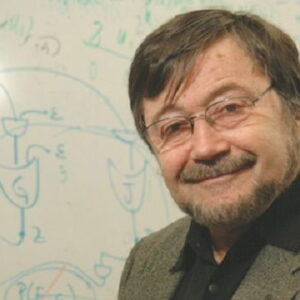Judea Pearl is a renowned computer scientist and philosopher whose work in artificial intelligence, causation, and Bayesian Networks has earned him an international reputation. Professors at UCLA consider Pearl, an Israeli-American, as one of the giants in the field of artificial intelligence. This is largely due to the fact that his work transformed the concept of causation in the domains of statistics, psychology, medicine, and the social sciences. Pearl is a member of the National Academy of Engineering and the American Association for Artificial Intelligence’s founding Fellow. Inspired by his interest in the philosophy of science, knowledge representation, nonstandard logics, and learning, he devised a high-level cognitive model. His contribution to the advancement of artificial intelligence is unparalleled. He has written over 350 scientific articles and three books. Numerous scientific medals and prizes have been bestowed upon him, including the Association for Computing Machinery A.M. Turing Award, the highest honor in computer engineering.
Youth and Early Life
Judea Pearl was born in Tel Aviv, Israel, in 1936.
After completing his preparatory studies, he enrolled at the Technion-Israel Institute of Technology, where he earned a Bachelor of Science in Electrical Engineering in 1960.
In the same year, he relocated to the United States to pursue graduate studies and was accepted to Newark College of Engineering. He earned a master’s degree in electrical engineering in 1961.
In 1965, he earned a Master of Science in Physics from Rutgers University and a Doctor of Philosophy in Electrical Engineering from the Polytechnic Institute of Brooklyn, United States.
Judea Pearl’s Career
After completing his academic education, he began working as a researcher at the RCA David Sarnoff Research Laboratories in Princeton, New Jersey, and Electronic Memories, Inc. in Hawthorne, California, positions he held until 1969. His qualifications included research on superconductive parametric and storage devices for advanced memory systems.
In 1969, he joined the School of Engineering at UCLA and began working on probabilistic artificial intelligence.
His important contributions to artificial intelligence, human reasoning, and the philosophy of science have earned him an international reputation over the years.
He has produced over 350 research articles on a variety of artificial intelligence-related issues. Additionally, he has authored three books on the aforementioned subject of study. These include 1984’s “Heuristics,” 1988’s “Probabilistic Reasoning,” and 2000’s “Causality.”
As the creator of Bayesian networks and a proponent of probabilistic approaches to artificial intelligence, he has made the greatest contribution to the area of artificial intelligence. Moreover, he is the first to construct a structural model-based theory of causal and counterfactual inference.
After the loss of his journalist son, he and his family established the Daniel Pearl Foundation. The organization’s primary objective is to promote truthful reporting and East-West understanding. It also seeks to foster mutual understanding between Jews and Muslims. In 2002 and 2003, the group got two prizes simultaneously.
Currently, he is a computer science and statistics professor at UCLA. He is also the Director of the UCLA Cognitive Systems Laboratory. In addition, he is a member of NGO Monitor’s International Advisory Board.
Awards & Achievements
In 2001, the London School of Economics presented him with the Lakota’s Award for writing the greatest book in the philosophy of science.
He earned the ACM Allen Newell Award in 2003.
In 2006, he was awarded the inaugural Purpose Prize by Civic Venture, which recognizes persons aged 60 and older who have displayed extraordinary vision in tackling neighborhood and national issues.
In 2008, he was awarded the Benjamin Franklin Medal for Computer and Cognitive Science by the Franklin Institute.
The David E. Rumelhart Prize for Contributions to the Theoretical Foundations of Human Cognition was granted to him in 2011. He was awarded the Harvey Prize in Science and Technology by his alma mater.
In 2011, he earned the A.M. Turing Award, the highest honor in computer engineering, from the Association for Computing Machinery for his “fundamental contributions to artificial intelligence through the construction of a calculus for probabilistic and causal reasoning.”
Personal History and Legacy
Ruth is married to him. The couple had three children, including journalist Daniel Pearl, who was kidnapped and murdered by Al-Qaeda extremists in Pakistan.
Together with his wife, he edited the book I Am Jewish: Personal Reflections Inspired by Daniel Pearl’s Last Words. The book was awarded the 2004 National Jewish Book Award for Anthologies for its exploration of how Jews define themselves in the post-September 11 age.
On the seventh anniversary of his son’s death, he penned an essay for the Wall Street Journal titled “Daniel Pearl and the Normalization of Evil: When Will Our Prominent Figures Stop Excusing Terrorism?”
Estimated Net worth
University professor, physicist, philosopher, engineer, computer scientist, and artificial intelligence researcher Judea Pearl is reported to have a net worth of $9 million dollars. We lack sufficient evidence regarding Judea Pearl’s automobiles and way of life.
Trivia
In 2002, extremists in Pakistan kidnapped and murdered Daniel Pearl, a Wall Street Journal writer and son of an Israeli-American computer scientist and philosopher.


